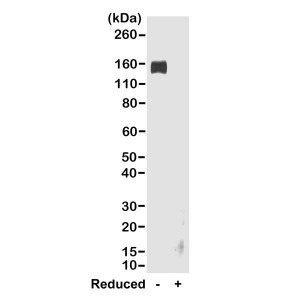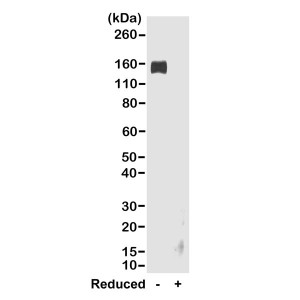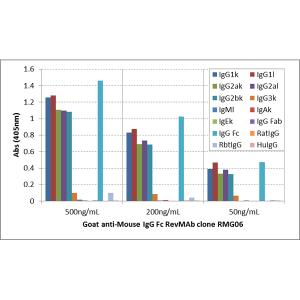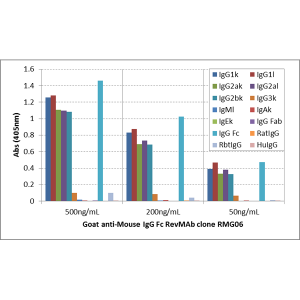
Western blot of nonreduced(-) and reduced(+) rabbit IgG (20ng/lane), using 0.2ug/mL of RevMAb clone RMG01. This antibody reacts to nonreduced rabbit IgG (~150 kDa).
anti-IgG Fc (rabbit), Goat Monoclonal (RMG02) (Biotin)
REV-41-1015-02
ApplicationsWestern Blot, ELISA
Product group Antibodies
ReactivityRabbit
Overview
- SupplierRevMAb Biosciences
- Product Nameanti-IgG Fc (rabbit), Goat Monoclonal (RMG02) (Biotin)
- Delivery Days Customer2
- ApplicationsWestern Blot, ELISA
- CertificationResearch Use Only
- ClonalityMonoclonal
- Clone IDRMG02
- Concentration1 mg/ml
- ConjugateBiotin
- HostGoat
- IsotypeIgG
- Scientific DescriptionImmunoglobulin G (IgG), a monomer, is the predominant Ig class present in serum. Produced as part of the secondary immune response to an antigen, this class of immunoglobulin constitutes approximately 75% of total serum Ig. Rabbits only have one IgG subclass with two kappa light chain types K1 and K2. Because of its relative abundance and excellent specificity toward antigens, IgG is the principle antibody used in immunological research and clinical diagnostics. The common rabbit IgG isotype has a molecular weight of 150 KD, with two heavy chains (about 50 KD each) and two light chains (about 25 KD each) under the non-reducing condition. This anti-rabbit secondary antibody has well-characterized specificity for rabbit IgG immunoglobulins Fc region and is useful in the detection, sorting or purification of its specified target. In general, secondary antibodies offer increased versatility enabling users to use many detection systems (e.g. HRP, AP, fluorescence). They can also provide greater sensitivity through signal amplification as multiple secondary antibodies can bind to a single primary antibody. - Recombinant Antibody. This antibody reacts to the Fc region of Rabbit IgG. No cross reactivity with human IgG, rat IgG, or mouse IgG. Applications: WB (nonreduced), ELISA. Source: Goat. Liquid. 50% Glycerol/PBS with 1% BSA and 0.09% sodium azide. Immunoglobulin G (IgG), a monomer, is the predominant Ig class present in serum. Produced as part of the secondary immune response to an antigen, this class of immunoglobulin constitutes approximately 75% of total serum Ig. Rabbits only have one IgG subclass with two kappa light chain types K1 and K2. Because of its relative abundance and excellent specificity toward antigens, IgG is the principle antibody used in immunological research and clinical diagnostics. The common rabbit IgG isotype has a molecular weight of 150 KD, with two heavy chains (about 50 KD each) and two light chains (about 25 KD each) under the non-reducing condition. This anti-rabbit secondary antibody has well-characterized specificity for rabbit IgG immunoglobulins Fc region and is useful in the detection, sorting or purification of its specified target. In general, secondary antibodies offer increased versatility enabling users to use many detection systems (e.g. HRP, AP, fluorescence). They can also provide greater sensitivity through signal amplification as multiple secondary antibodies can bind to a single primary antibody.
- ReactivityRabbit
- Storage Instruction-20°C,2°C to 8°C
- UNSPSC41116161



